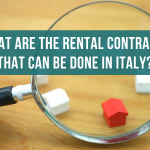10 things to know on rent to buy (in Italy)

10 things to know on rent to buy (in Italy)
In this last period of the year I found myself selling some properties with formulas called “help to buy” or atypical sales contracts, which have proved an excellent solution for certain specific cases.
I’m writing an article, which will then link to it, it can be a general overview of all possibilities of unusual real estate purchase in Italy. For the moment I thought useful to translate for you the 10 things to know on rent to buy (in Italy), presented in a guidebook prepared by the Board of Notaries, found at the following link (in Italian) Guida al Rent to buy (in Italian)
Unfortunately, my English level is not professional, I try to translate the best I can, but if something is not clear please email me at info@ortalloggi.com
1. What is a rent to buy contract?
It is a new type of contract under which the owner delivered immediately the property to the tenant (prospective buyer), upon payment of a fee which must include two distinct components: one for the usage fee, and a charge to the final sale price. After a certain period of time the tenant can decide whether to purchase the property, by deducting from the price component of the royalties paid destined to the purchase price.
2. The tenant is obligated to buy the house after the period of use? Within which period he may decide to buy it?
No, the law provides that the tenant has the right to purchase the property, but not the obligation. Of course, the parties may agree that the tenant is obligated to purchase, but then the contract is different from the rent to buy. The period within which the tenant may decide to buy the house is determined by the parties (the purchase shall take place within ten years if he wants to maintain the effect of transcription booking).
3. What are the benefits and risks for sellers?
The main advantage is the ability to find a larger number of potential buyers. The risk is that the tenant decides not to buy the property. In this case, however, the owner may retain all or part of what has been paid from the conductor. The other risk is that the defaulting tenant still occupies the house, and the owner must make application to the court to release and sell it to others.
4. In case of non purchase or non-payment of fees the owner will undertake an eviction proceeding, with all that entails in terms of time and costs?
The procedure is not to eviction, but the release of the house. The release time of the good depends on the individual courts.
5. There are other safeguards that the seller must take?
The owner is entitled to keep a portion of money in the event that the tenant does not purchase, so the owner being adequately compensated for the failure to conclude other business. This also indicates the seriousness of the conductor to the purchase of the house.
6. The conductor is protected?
Yes. The law provides for the registration in a land registers of the rent to buy contract, which will allow the tenant to purchase the object free from mortgages, foreclosures, or other detrimental that may emerge after the transcription of the contract. The transcript has a maximum duration of ten years. This protection remains even in case of bankruptcy of the seller.
7. What can be the subject of rent to buy? They can be buildings under construction?
The rent to buy may be stipulated for any real estate: apartments, garages, cellars, shops, offices, warehouses and shops. Even land. It can also relate to a building under construction. For construction companies the rent to buy may be a good instrument to pay the mortgage payments originally contract for construction.
8. In rent to buy related to a property under construction, if the company fails the tenant loses their money?
No: the contract of rent to buy also continues in the event of the owner’s failure. In addition, the sale is not subject to bankruptcy revocatory, if agreed at the right price and in the case of a principal residence of the tenant or his relatives.
9. The tenant/buyer may retain the option to reserve the appointment of a third party?
Yes, the law does not exclude this possibility, so it has to be recognized to the tenant the right to reserve the appointment of a third party, such as in the partial contracts. You can also proceed to the sale of the contract.
10. What taxes are paid? The rent to buy is convenient?
The tax treatment has been clarified by the Inland Revenue in a separate explanatory circular (no. 4 / E of 19 February 2015).
For any information about the process of buying a house in Italy, write to info@ortalloggi.com. I will be happy to answer your questions.
Alice – www.ortalloggi.com
#ortalloggi #lakeforlike #lakeorta #italy #lookingforsecondhome #acquistocasa #fasiacquistoimmobiliare #casa #nuovacasa #agenziaimmobiliare #realestateagency #renttobuy #helptobuy


